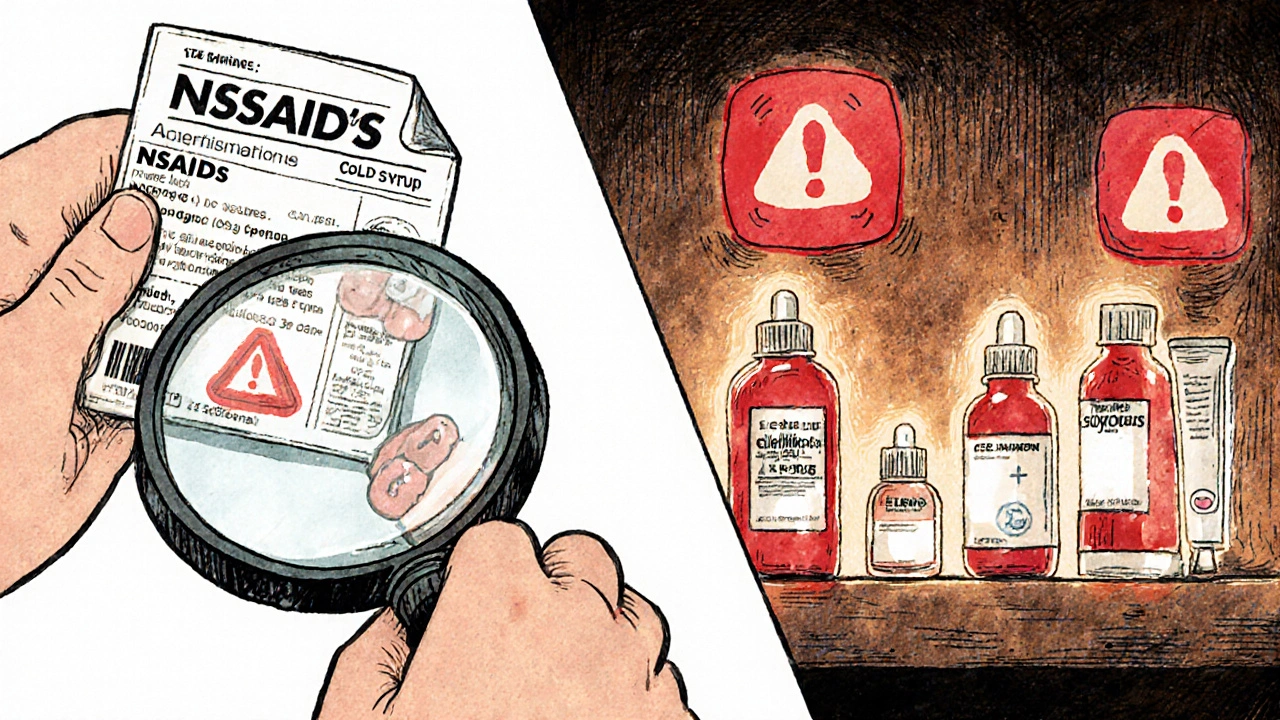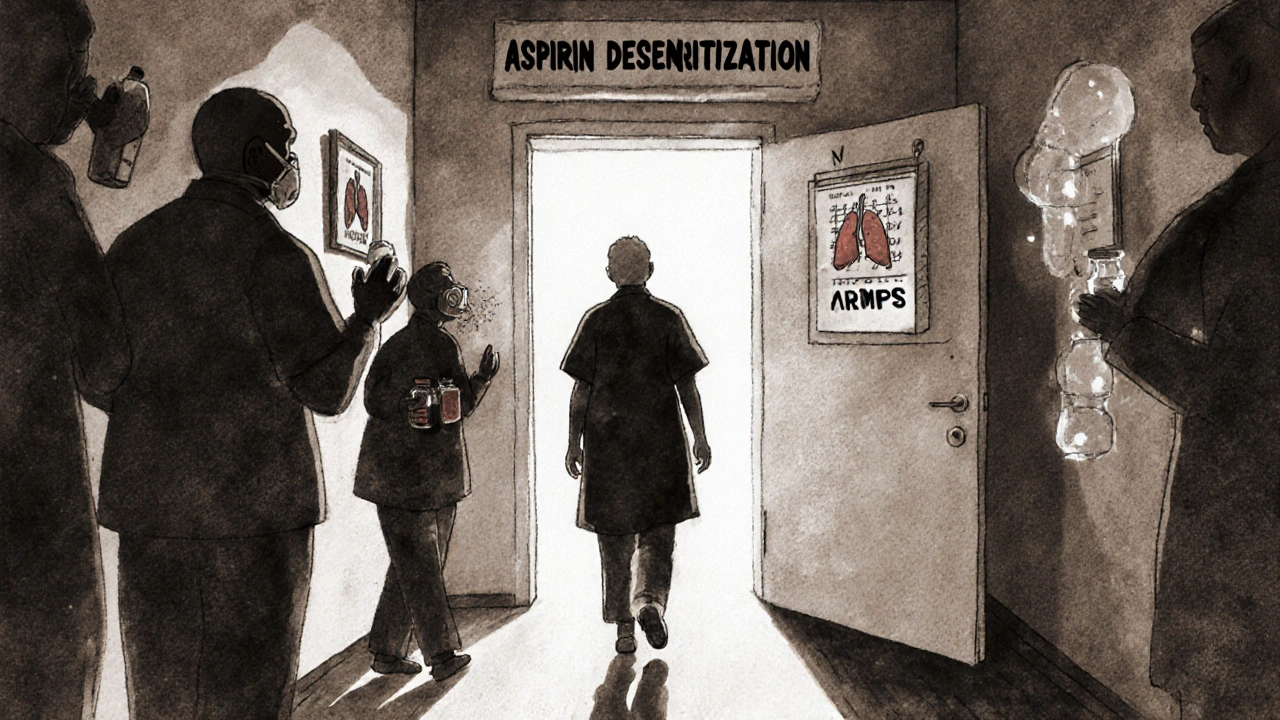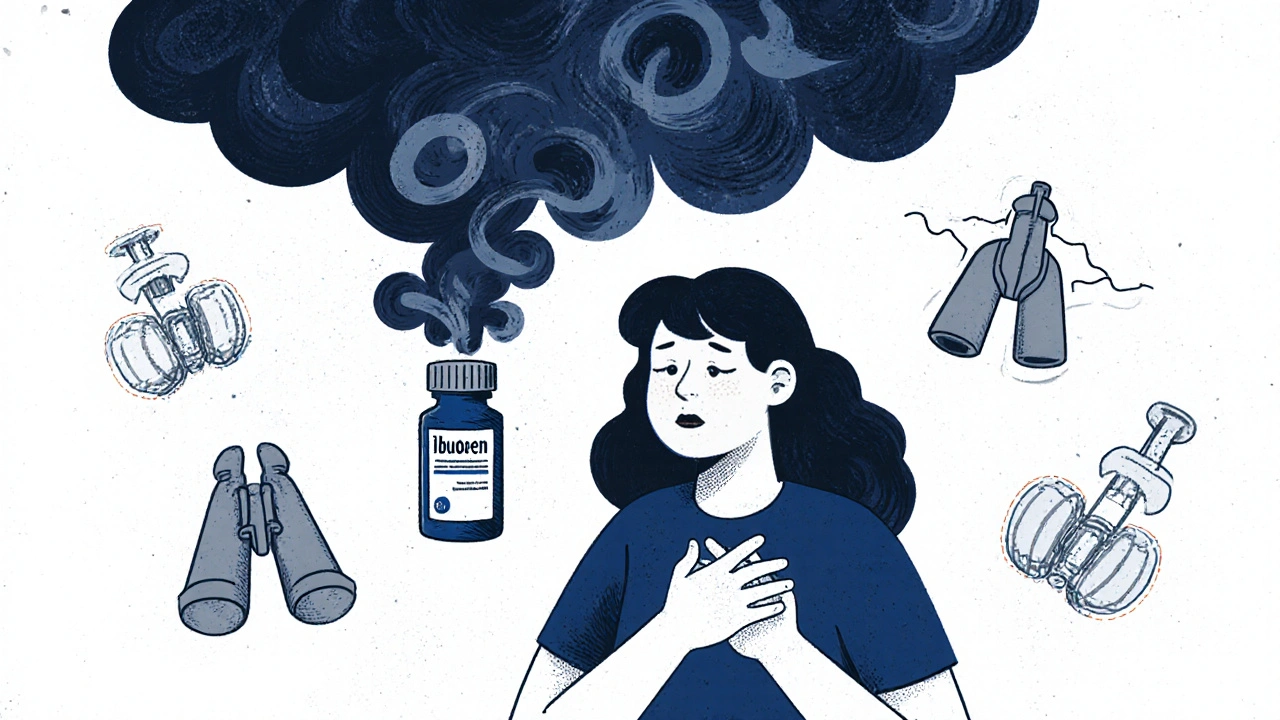If you have asthma and take ibuprofen, aspirin, or naproxen for a headache or sore muscles, you could be at risk for a dangerous reaction-even if you’ve taken them before without issues. This isn’t just an allergy. It’s a condition called NSAID-Exacerbated Respiratory Disease (NERD), also known as Aspirin-Exacerbated Respiratory Disease (AERD). It affects about 7% of adults with asthma, but that number jumps to 40-50% if you also have chronic sinus problems and nasal polyps. And unlike typical allergies, this reaction doesn’t show up on skin tests or blood tests. It sneaks in quietly, often mistaken for a cold or worsening asthma until it hits hard.
What Happens in Your Body When You Take NSAIDs?
NSAIDs like aspirin, ibuprofen, and diclofenac work by blocking an enzyme called COX-1. That’s fine for most people. But in those with NERD, blocking COX-1 triggers a chain reaction. Your body starts making too many inflammatory chemicals called cysteinyl leukotrienes. At the same time, it stops making protective ones like prostaglandin E2. The result? Your airways swell, mucus builds up, and your lungs tighten up-fast.
Reactions usually start within 30 minutes to 3 hours after taking the drug. Symptoms can include sudden nasal congestion, runny nose, wheezing, chest tightness, and in severe cases, full-blown asthma attacks that require emergency care. Some people even lose their voice or feel like they’re suffocating. These aren’t mild side effects. They’re life-threatening.
Who’s Most at Risk?
It’s not random. NERD tends to hit specific groups:
- Adults between 30 and 40 years old-rarely diagnosed before age 20
- Women-about 70% of cases are female
- People with chronic sinusitis and nasal polyps-up to half of them have NERD
- Those with poorly controlled asthma or a history of severe asthma attacks
- People who smoke or have a family history of asthma or allergies
Many patients don’t realize they have NERD until they end up in the ER after taking an over-the-counter painkiller. They think, “I’ve taken ibuprofen before,” but that’s the trap. Reactions can build up over time. One dose might be fine. The next could trigger a crisis.
What Medications Should You Avoid?
It’s not just aspirin. Any NSAID can trigger a reaction:
- Aspirin (even low-dose 75mg tablets)
- Ibuprofen (Advil, Motrin)
- Naproxen (Aleve, Naprosyn)
- Diclofenac (Voltaren)
- Ketoprofen, indomethacin, celecoxib (in some cases)
And here’s the tricky part: NSAIDs hide in places you wouldn’t expect. Check the labels of cold and flu medicines, menstrual pain relievers, arthritis creams, and even some eye drops. “Pain relief” or “anti-inflammatory” on the box? That’s a red flag. Many people don’t realize that a common headache pill contains ibuprofen, and that’s what triggered their asthma attack.

What Can You Take Instead?
You don’t have to suffer in pain. Safe alternatives exist:
- Acetaminophen (paracetamol): The go-to for most NERD patients. Up to 1000mg per dose is usually safe. But 5-10% of people still react to higher doses, so stick to the lowest effective amount.
- Celecoxib (Celebrex): A COX-2 selective inhibitor. Most NERD patients tolerate this well, though it’s not risk-free and should be used under doctor supervision.
- Tramadol or codeine: For moderate to severe pain, these opioid-type medications don’t affect the COX pathway and are often safe.
Always check with your pharmacist or doctor before trying a new painkiller-even if it’s sold over the counter. What’s safe for one person with asthma might not be safe for you.
Is There a Treatment That Can Help?
Yes-but it’s not for everyone. Aspirin desensitization is a medical procedure done in a hospital under close supervision. You’re given tiny, increasing doses of aspirin over hours or days until your body stops reacting. Once desensitized, you can take daily aspirin without triggering symptoms.
Why would you do this? Because it doesn’t just prevent reactions. For many, it improves asthma control, reduces nasal polyp growth, and lessens the need for steroid sprays or surgery. Studies show patients who complete desensitization have fewer ER visits and better quality of life.
But it’s not a quick fix. It requires commitment, regular aspirin dosing, and ongoing monitoring. It’s only offered at specialized allergy or immunology centers. If you’re considering it, talk to your pulmonologist or allergist.
How to Stay Safe Every Day
Knowledge is your best defense. Here’s what to do:
- Get tested if you’re at risk. If you have asthma plus nasal polyps or chronic sinusitis, ask your doctor about NERD. A supervised aspirin challenge test can confirm it.
- Carry a medical alert card. List your condition and all NSAIDs to avoid. Emergency responders need to know this fast.
- Read every label. Look for: ibuprofen, naproxen, diclofenac, ketoprofen, aspirin, salicylate. Even “natural” pain relief creams can contain these.
- Keep a symptom diary. Note when you took a painkiller and what happened. This helps your doctor spot patterns.
- Don’t assume “natural” means safe. Willow bark, turmeric, and other herbal remedies can have aspirin-like effects. Ask your doctor before using them.
Many patients report feeling relieved once they finally get a diagnosis. “I thought I was just getting sicker,” one woman in Melbourne told her allergist. “Turns out, every time I took a cold tablet, I was setting off my asthma. I just didn’t connect the dots.”

What About Kids?
NSAID sensitivity is rare in children under 12. But research from Taiwan’s national health database shows that short-term use of ibuprofen or aspirin in kids with asthma can increase the risk of an asthma flare-up by nearly 50%. The same study found no link with long-term use, suggesting it’s the sudden exposure that triggers the reaction-not daily use.
Still, if your child has asthma and nasal polyps, be cautious. Stick to acetaminophen for fever or pain unless your pediatrician says otherwise.
When to Call for Help
Seek emergency care immediately if you experience:
- Sudden wheezing or trouble breathing after taking a painkiller
- Swelling in your throat or tongue
- Feeling faint or lightheaded
- Severe chest tightness that doesn’t improve with your inhaler
Don’t wait to see if it gets better. These reactions can escalate quickly.
Can I take acetaminophen if I have NSAID sensitivity?
Yes, acetaminophen (paracetamol) is generally safe for people with NSAID sensitivity. Most patients tolerate doses up to 1000mg per dose without issues. However, about 5-10% of people with NERD may still react to higher doses, so stick to the lowest effective amount. Always check with your doctor if you’re unsure.
Is aspirin desensitization right for me?
Aspirin desensitization may be an option if you have severe asthma, nasal polyps, and frequent flare-ups despite standard treatment. It’s not for everyone-it requires multiple visits to a specialist center, daily aspirin use afterward, and careful monitoring. But for many, it reduces asthma attacks, shrinks nasal polyps, and cuts down on steroid use. Talk to an allergist or immunologist if you’re interested.
Why do some painkillers trigger asthma and others don’t?
It’s about how they affect your body’s enzymes. NSAIDs like aspirin and ibuprofen block COX-1, which triggers a chain reaction leading to inflammation in the airways. Acetaminophen doesn’t block COX-1 the same way, so it’s usually safe. COX-2 inhibitors like celecoxib also avoid this pathway, making them safer alternatives. But not all COX-2 drugs are equally safe-always check with your doctor.
Can I use ibuprofen cream or gel if I have NERD?
Topical NSAIDs like diclofenac gel or ibuprofen cream can still be absorbed into your bloodstream, especially if applied to large areas or broken skin. While the risk is lower than with pills, there are documented cases of asthma reactions from topical use. It’s safer to avoid them entirely unless your doctor says it’s okay.
I’ve never had a reaction before. Does that mean I’m safe?
Not necessarily. NERD can develop over time. Many patients take NSAIDs for years without issues, then suddenly have a severe reaction. This often happens after a viral infection, during hormonal changes, or as asthma worsens. If you have chronic sinusitis or nasal polyps, you’re at higher risk-even if you’ve never reacted before. Don’t assume safety based on past use.
Should I get tested for NERD?
If you have asthma and nasal polyps or chronic sinusitis, yes. Even if you’ve never had a reaction, testing can prevent a future emergency. A supervised aspirin challenge test is the gold standard. It’s done in a hospital with emergency equipment on hand. If you’re unsure, ask your pulmonologist or allergist.
Final Thought: Don’t Guess-Know
NSAID sensitivity isn’t rare. It’s underdiagnosed. People suffer because they don’t know what’s causing their attacks. If you have asthma-especially with sinus issues-don’t wait for an emergency to find out. Talk to your doctor. Get tested. Learn what’s in your medicine cabinet. Your breathing depends on it.


Laura-Jade Vaughan
November 16, 2025 AT 09:03OMG I had no idea ibuprofen could do this 😱 I’ve been popping Advil like candy since college and now my sinuses are a disaster zone. So it’s not just ‘allergies’? Like… my whole life has been a lie? 🤯
Rodney Keats
November 17, 2025 AT 12:58Of course the FDA doesn’t make this common knowledge. Why would they? People need to keep buying meds and showing up in ERs. It’s a beautiful money machine. 🤡
Jennifer Stephenson
November 19, 2025 AT 03:00Acetaminophen is safe. Avoid NSAIDs. Read labels. Simple.
Segun Kareem
November 19, 2025 AT 09:25This is the kind of knowledge that saves lives-not just in the West, but everywhere. In Lagos, people buy painkillers like snacks. No labels. No warnings. If we can spread this truth, maybe we stop one more person from gasping for air in a clinic with no oxygen. 🙏
Philip Rindom
November 20, 2025 AT 17:24Wait so celecoxib is safe? I’ve been taking it for my knees and never had a problem… but now I’m paranoid. Like, is my knee pain worth risking my lungs? 😅
Jess Redfearn
November 22, 2025 AT 01:41Did you know some toothpaste has salicylates? I think my asthma is from brushing my teeth. 🤔
Ashley B
November 22, 2025 AT 04:39This is all a Big Pharma lie. They don’t want you to know that turmeric and CBD oil cure everything. The real cause? 5G radiation + glyphosate in your water. They test NSAIDs on poor people so they can sell you ‘safe’ acetaminophen at 3x the price. 🚨
Sharon Campbell
November 24, 2025 AT 02:43who even uses naproxen anymore? i mean, come on. and why does everyone keep saying ‘ibuprofen’ like its the devil. i take it and im fine. maybe your asthma is just bad. 🙄
sara styles
November 25, 2025 AT 07:16Let me tell you what’s really going on. The NIH funded this study because they want to push aspirin desensitization so they can patent the protocol and sell it to hospitals for $15k per patient. Meanwhile, natural remedies like bromelain and quercetin have been proven to block leukotrienes since 2008-but you won’t hear about that because Big Pharma owns the journals. I’ve been doing a 10-year longitudinal study on my own symptoms and I can prove it. I’ve got graphs. I’ve got data. I’ve got 37 PDFs. I’ll send them to you if you DM me. This is bigger than you think.
Brendan Peterson
November 25, 2025 AT 13:08Actually, the 7% statistic is misleading. It’s based on tertiary care populations. In primary care, the prevalence is closer to 2.1%. Also, celecoxib isn’t risk-free-there are case reports of reactions even with COX-2 inhibitors. The real takeaway? Don’t self-diagnose. See an allergist.
Jessica M
November 26, 2025 AT 21:52As a respiratory nurse with 18 years of experience, I’ve seen this exact scenario repeat daily. Patients come in gasping after taking Advil, convinced they’re ‘just allergic.’ They’re not. They have NERD. And if they’d been tested earlier, they could’ve avoided intubation. Please, if you have asthma and polyps-ask for the aspirin challenge. It’s not scary. It’s life-changing.
Erika Lukacs
November 28, 2025 AT 08:31It’s fascinating how modern medicine pathologizes the body’s response to synthetic compounds, while ancient traditions quietly understood the harmony between inflammation and healing. Perhaps the solution isn’t substitution, but reintegration.
Willie Randle
November 30, 2025 AT 01:05If you’re reading this and you’re scared, you’re not alone. I had NERD for 12 years before I got diagnosed. I thought I was just ‘bad at asthma.’ Now I take acetaminophen, carry my alert card, and even teach my coworkers how to read medicine labels. You can live well. You just need to know the rules.
Connor Moizer
November 30, 2025 AT 09:39Look, I get it-you’ve taken ibuprofen for years and nothing happened. But if you’ve got polyps or chronic sinus infections? You’re playing Russian roulette with your lungs. Get tested. It’s a 2-hour procedure. No surgery. No needles. Just a tiny aspirin and some monitoring. If it’s positive, you get a roadmap. If it’s negative? You can chill. Either way, you win.